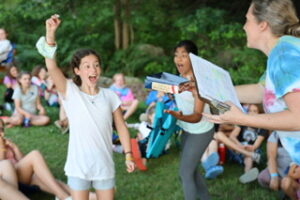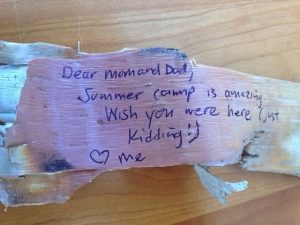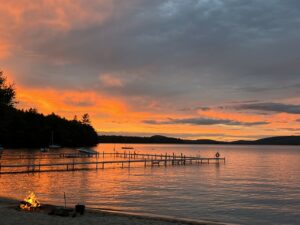Feeling ‘ready’ for camp is an exciting milestone for kids – sometimes they are able to self-advocate for wanting to attend camp and come readily equipped with the confidence to take on a new experience. My conversations with new and prospective camp families, however, have taught me that most campers don’t fall into this category – it is normal to feel apprehensive and uncertain about camp!
Camp is a powerful builder of confidence and independence – especially for return campers – but it can be a bit of a catch-22: how can you feel ready for such a major confidence-building experience without first feeling confident enough to try it?
Luckily, there are ways we can help our campers and children feel ready – or, at the very least, willing – to try a major new experience like camp.
Start Small: Harmony Land Camp
Runoia created its Harmony Land Camp program precisely for the purpose of scaffolding our youngest campers toward comfort and a positive first experience with overnight camping. With expert support and individualized care, Harmony Land campers can grow their confidence over a summer or two in this program before taking the leap of attending a longer 3-week session of our typical camp program. HLC is tailored for kids aged 6-8 to form tight-knit friendships, explore new interests, and ease into camp life. Choose from ‘mini’ 9-day sessions OR our standard 12-day HLC sessions.
HLC is such a wildly popular ‘starter camp’ program at Runoia, we added a new session in 2023!
AND – we’ve heard our parents and families saying that even at older ages, our kids aren’t feeling ‘ready’ for the full 3-week sleep-away experience.
SO, we’ve opened up our HLC B session to a new, older age group: rising 5th graders and 10-year-olds are now welcome to enroll in this Harmony Land Camp session!
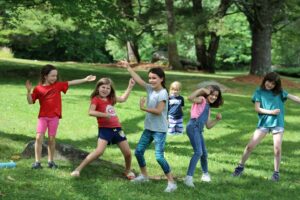
Practice
Like anything else, being away from family members and ‘safe space’ people for a few weeks can be daunting.
Think of how you can help your child practice being away from home and family members they see daily, by doing things like attending sleep-overs with friends or spending the night at a grandparent’s or trusted family member’s house.
You can also help your child practice independence with tasks that you typically help them with so they can feel more prepared at camp – things like brushing their own hair, picking out outfits for their activities, or making their bed – but rest assured that they will also have caring counselors to help them.
Make a friend
Runoia aims to support new campers by helping them create connections and form bonds leading up to camp. Runoia buddies up penpals between returning and new campers in the spring to help first-time Runoia campers make connections and have a buddy they’ve spent time talking to on the first day they arrive at camp.
Talk about how to self-advocate with your child
One of the most important life skills that we help our campers build every summer is self advocacy. We encourage our campers to speak up for themselves, let someone know when they need help, and to identify and feel comfortable approaching trusted adults in our community.
It helps to talk with your child about self advocacy and how and who to approach for help at camp. Luckily, camp is well-equipped with caring adults prepared to help your child at any moment. Some of the trusted adults and helpers in our community that your child can ask for help are:
- Directors and assistant directors
- Leadership staff – look for someone with a walkie talkie
- Your child’s Head of Cabin (HOC)
- Your child’s cabin counselors
- Program staff during classes
- CITs
No Surprises – Setting Expectations
Having clear expectations and knowing what to anticipate is important for a child’s first camp experience, especially if they are feeling on the apprehensive side. You can help your child form realistic expectations for camp by:
- Talking regularly about camp leading up to the summer and listen to how they’re imagining it, what they’re most excited for, etc.
- Going through our website and using different tools like our media galleries, videos, our virtual tour, etc. to help them form an idea of camp
- Discussing how you will communicate over the summer – including learning how to write and send letters if necessary – campers should know that phone calls, promises to be picked up, etc. are not realistic expectations for camp
- Identifying and discussing things that will look and feel different at camp – like meals, showers and self care, alone time, etc.
- Still have questions? Give us a call!
Prepare Coping Skills
When the inevitable does happen at camp – having a bad moment or day, struggling with a new skill, adjusting to a new social situation – it’s important for kids to know that they can do hard things and have the skills and tools to move through those tough feelings. ‘Coping skills’ may sound like a scary term meant for crisis situations, but really they’re helping tools for us all to use when we’re feeling a bit stressed or overwhelmed. Coping skills can be distraction methods, tools for processing emotions, physical calming strategies, and more.
Look through our suggested guide of camp-specific coping skills at the end of this blog and help your camper make their own, individualized list that they can use at camp.
At the end of the day, we may never really be fully ‘ready’ for anything we try in life – and we think it’s okay to jump in anyway. At camp, our counselors and campers learn that they are capable of doing hard things. Sometimes we have to do things scared, or we’ll never do them at all. And whatever happens along the way, we can handle it with our community by our side.
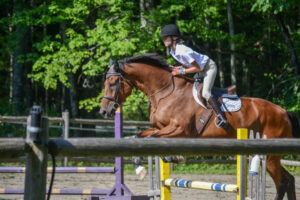
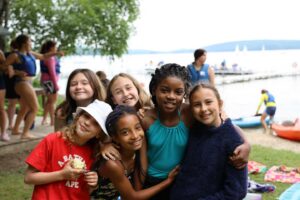 As we round the corner into what feels like the back half of fall, many families are, possibly for the first time, searching for and choosing a brand new camp for their kid(s). Choosing a camp requires placing a lot of trust into camp professionals to care for your child and to provide a dream experience – but that trust doesn’t need to be blind. At Runoia, it is our goal to help campers find their best fit camp. We are always thrilled when that happens to be Runoia, but each camp is entirely unique from the next. It’s important to know what’s important to you (and your child,) ask the right questions, and pursue that experience. After countless parent phone calls and Zooms, here are the top things we suggest parents and guardians think about when choosing a camp, and some helpful questions to ask a camp director when looking:
As we round the corner into what feels like the back half of fall, many families are, possibly for the first time, searching for and choosing a brand new camp for their kid(s). Choosing a camp requires placing a lot of trust into camp professionals to care for your child and to provide a dream experience – but that trust doesn’t need to be blind. At Runoia, it is our goal to help campers find their best fit camp. We are always thrilled when that happens to be Runoia, but each camp is entirely unique from the next. It’s important to know what’s important to you (and your child,) ask the right questions, and pursue that experience. After countless parent phone calls and Zooms, here are the top things we suggest parents and guardians think about when choosing a camp, and some helpful questions to ask a camp director when looking: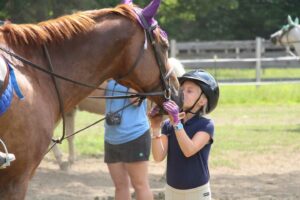
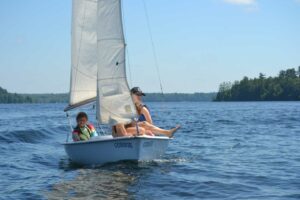 Structured or elective?
Structured or elective?